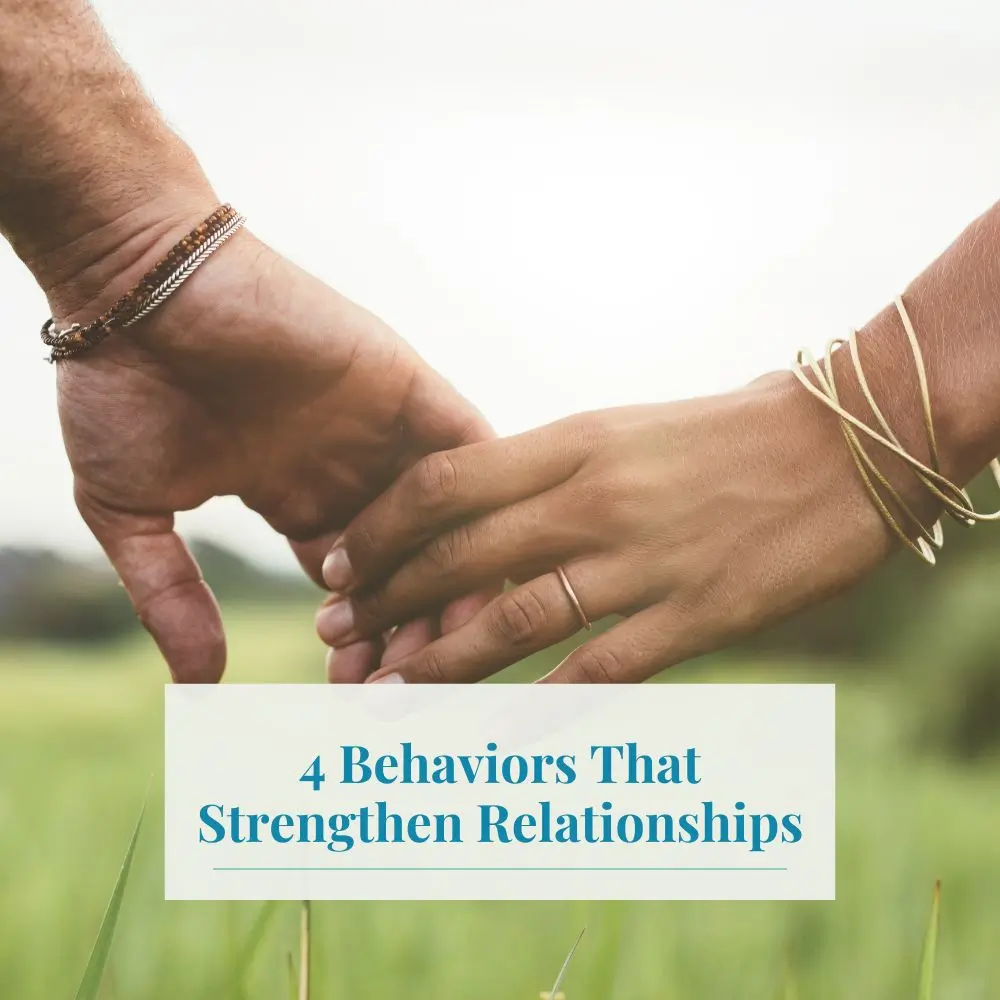4 Behaviors That Strengthen Relationships

Get ready to learn four behaviors that can really strengthen your relationship, especially if you engage in behaviors that are hurtful to your relationship.
Dr. John Gottman, a popular couples researcher, has done extensive research on what makes relationships thrive and what behaviors are detrimental. He has said that he can predict with 93% accuracy whether a couple will get divorced based on their interactions. These harmful behaviors are what he calls The Four Horsemen. In this blog, I’ll review not only these behaviors but also their antidotes.
Table of Contents
Watch Video: “4 Behaviors That Strengthen Relationships”
Read Blog: “4 Behaviors That Strengthen Relationships”
1st Behavior that Strengthens Relationships: Gentle Start-Ups
Gentle start-ups are the antidote to Criticism. The first harmful relationship behavior to avoid. Criticism involves verbally attacking or insulting your partner, often targeting their character. An example might be saying, “I can’t believe you forgot about date night again! You don’t care about me at all.”
It makes sense that most of our partners will not respond well to criticism even if the message that is underneath the criticism is valid. So you’re work is to deliver the message in a way that it’s most likely to be received. That’s where gentle start-ups come in.
Gentle startup involves using “I” statements and expressing a positive need. For instance, instead of the critical statement above, you could say, “I feel unimportant when date night is not a priority. I need us both to prioritize date night again.” It’s also crucial to consider your tone and timing. If you’re hurt or angry, it might not be the best time to discuss your needs. Another tip is to check in with your partner to see if it’s a good time to talk before just bombarding them.
2nd Behavior that Strengthens Relationships: Appreciation
Creating a culture of appreciation is a crucial behavior to practice instead of Contempt. Contempt takes criticism to the next level, involving a sense of superiority over your partner. This might manifest in sarcastic remarks, eye-rolling, or direct insults like, “You’re such a slob. Our two-year-old could keep this house cleaner than you.” Contempt can also include verbal abuse with the intent to harm. This behavior can be incredibly toxic to the relationship and the one most likely to predict a relationship ending.
Combat contempt by fostering a culture of appreciation. Notice and express gratitude for positive traits or actions. An exercise I recommend is to express appreciation daily. You can practice this exercise by making it a point to notice 1-3 positive acts that your partner did that day. Find some time when you’re together and express that appreciation. For example, you can say, “Thanks, baby, for making my coffee just the way I like it!”
This shifts focus from negative traits to positive ones, creating a more appreciative environment. Generally, keep in mind to treat your partner with the same respect and kindness you would offer a stranger or acquaintance.
3rd Behavior that Strengthens Relationships: Taking Responsibility & Apologizing
This third behavior is an antidote to defensiveness. Defensiveness occurs when you shift the blame or deflect responsibility. For example, if you are asked about a task you agreed to, and you respond with, “I can’t believe you’re asking me this. You know how busy I am. Why didn’t you do it yourself?”
If you are prone to getting defensive, try to practice building in a pause before responding with the first thing that comes to mind. Try to listen and understand what your partner is expressing. Take ownership of your part and apologize sincerely. For example, “I’m really sorry. You did ask me to do that last week, and I’ve been putting it off. I’ll get to it tomorrow.” This signals to your partner that you genuinely care about what they are sharing with you.
4th Behavior that Strengthens Relationships: Self-Soothing
This practice is an antidote to stonewalling. Stonewalling is shutting down or withdrawing from a conversation, often due to feeling overwhelmed. When I say feeling overwhelmed, I mean that your body has activated your nervous system because something about this interaction no longer feels emotionally safe. But on the outside, your partner might not be able to see it. All they see is you giving the silent treatment, looking away and disengaged, just saying what your partner wants to hear to end the conversation, or physically leaving the conversation abruptly.
If you tend to get overwhelmed, recognize the signs and take a break to self-soothe. Get curious about your internal signals that you’re starting to feel overwhelmed. Do you notice a change in your body (heart rate, feeling hot, knot in your stomach, etc.)? Do you notice a change in your thought patterns (mind is racing, repetitive defensive thoughts, etc)? Communicate clearly to your partner, “I’m feeling really overwhelmed and need a break. I want to continue this conversation, but I need 20 minutes to calm down.”
During this break, engage in activities that help you relax, like taking a walk or listening to music. Avoid ruminating on the argument to prevent keeping your nervous system activated or even escalating. It’s important to return to the conversation once you feel calmer.
Practicing the Behavior that Strengthen Relationships
If you’ve noticed yourself engaging in any of these unhelpful behaviors, don’t worry. Now that you have this knowledge, you can start practicing behaviors that strengthen relationships. It’s not just about learning these practices, but about actively implementing them in your relationship. Even if you feel stuck in negative cycles, remember that positive changes from just one partner can have a big impact on the relationship. Instead of focusing on your partner’s faults, focus on your own behavior.
It’s important to try to incorporate these antidotes into your daily routines, not just during challenging moments. And if you make a mistake, remember that you can always make it right. Consider scheduling regular check-ins to discuss your relationship – whether it’s weekly or bi-weekly. These discussions can help you understand each other, identify what’s working, and address areas for improvement.
Next Steps
For some more resources, check out the following:
- This blog on a book recommendation: Book Therapy: The Seven Principles for Making Marriage Work.
- If you could benefit from individual therapy, you’ll find more information on this page to help guide you.
- If you and your partner could benefit from couples therapy, you can find more information on this page.
- If you need extra resources and supportive coaching instead of therapy, feel free to explore my coaching business. I’m here to help!
And, like I always say, I hope you continue nurturing your mind, body, and soul!
